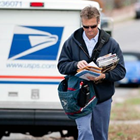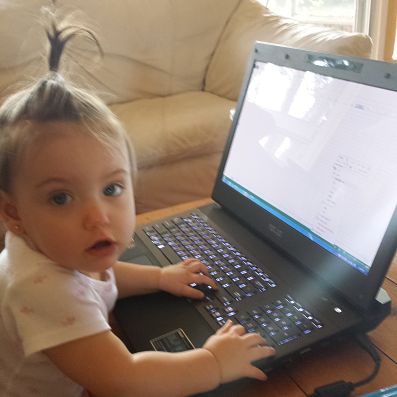
Jordan
Toronto, ON
Female, 28
Space Waitress, Trolley Dolly, Stewardess...everyone has their own term for us. We are the baby-sitters, life-savers, servers, cleaners and all-around problem solvers for any and every in-flight issue. Sometimes we get a bad rep for being apathetic and miserable despite having what looks like a glamorous job, so here's a peek into the gritty details beneath the shiny surface to explain why the job - though incredible in lots of ways - is more than just snappy uniforms and matching luggage.
Wow, that's a mighty broad question... I'm not sure if you mean the most common, or most horrible, or something else entirely, so I'll just tell you my top 5 things I dread having to deal with at work.
#5 - Having a problem with a crew member. If you've ever been a manager, or even just had to have a Conversation with a capital C with a co-worker because they were being a jerk, or not pulling their weight, or doing their job incorrectly, you'll get why this is a major difficulty. Add to that the fact that you might have to spend the next 5 days straight with them and you'll be ready to pull your hair out.
#4 - Running out of stock. This happens so often. Unfortunately we don't have a crystal ball to show us what's going to be popular at lunch on any given day so sometimes we just don't pack enough of a particular item. Most often it's cheese plates that we run out of (people love their cheese and I don't blame them), but even types of beer, or random items like tomato juice will become really hot commodities on a flight and before you know it I have to make my don't-shoot-the-messenger face (a cringe/defensive pose in case they strike) and say, "sorry, we're all out of that, can I tempt you with some tepid coffee instead?"
#3 - Delays. The angry looks and crying children and stressed out parents, argh! I hate it. It just makes everyone miserable, including the crew who got out of bed early for nothing, and we aren't getting paid for those extra hours of languishing in the airport while passengers give us the stink-eye.
#2 - Aircraft malfunctions. Maybe this should be my number one, but usually it's the pilots turn to stress in these situations and, in my experience, the passengers are typically calm, obedient, and patient. Plus, any mechanical hiccup that happened to me while mid-flight has always turned out 100% ok, (knock on wood) so it's not AS scary as my number one...
#1 - Medicals. At the very least, it means delays, mild stress and paperwork. At the very worst it means a life or death situation and that is just not what I hope to deal with when I get ready for work in the morning. I will be very happy if I can reach the end of my flight attendant career without ever having to use my first aid skills!
So there you have it. Now, as I read over my list, I realize I forgot Unruly Guests which should probably be #3 so let's just call this a Top 6 List and call it a day. All this talk of difficulties is stressing me out! :)
Hi there!
Actually there is no weight restriction at most, if any, North American airlines - I don't think they can legally prevent someone from getting hired for that reason. However, FAs do need to pass a medical exam before they can begin training, and that covers hearing, vision, as well as basic fitness and mobility - lifting the weight of the average suitcase for example (40-50lbs).
Our Boeing aircraft that we fly at my airline require us to bend over to arm our doors which is something that can be difficult if a flight attendant is extremely heavy. I work with people who are all shapes and sizes though, and at the end of the day an airline is looking for people who have great customer service skills, and who take safety seriously. If you look cute too, well, that's just a bonus :)
Actually there's quite a variety! I wish they were all 5 stars, but more often they're not that fancy, more of 3-4 star range (Holiday Inn, Radisson, etc). There's a team from the airline who visit the interested hotels in each city to verify that the establishment is up to company standards, and elected representatives from the pilot and flight attendant departments go along to give their two cents as well. The cleanliness and safety of the property is more important than the star rating, but I will say that the majority of hotels that crews stay in are nicer than what I pay for when I go on vacation!
Layovers at my airline are anywhere from 10 to 48 hours, so definitely there are days when there's time to hit the gym and a lot of crew members are itching to do just that! You can end up eating and sleeping so irregularly on the road that working out is one of those things that crew members feel in control of, and can make them feel better about the sometimes less than healthy environment we work in.
On occasion I'll pack some gym clothes but I would way prefer to explore the city! That's one of the greatest assets of the job, so when I work with flight attendants who just want to kick back in their hotel room and watch tv I can't really relate. Because of this job I've had opportunities to see parts of Canada I never visited before, not to mention all the other countries I've seen. I've visited museums, explored shopping districts, gone to festivals, and enjoyed food at countless restaurants... it sure beats the pay-per-view in the hotel room!
A perfect passenger is usually an invisible one! They board with ease, they don't have a million carry-ons, they respect the seatbelt sign, they are polite when I come through with service, and they may even give me a smile as they deplane. I know that doesn't sound very exciting, but it's also not that hard to be a great traveller! I like to tell myself that I was this kind of customer before I became an FA but that could be wishful thinking.
I also enjoy people who chit chat and joke around with me, or ask me questions, because I love to help out and interact with guests one on one, it makes my day a lot more interesting - but don't feel obligated if that's not your style!
And since you asked, please don't stand in the aisles when I'm doing service! I get it, when nature calls there's nothing we can do about it, but it is a pain moving my cart up and down the length of the plane so people can use the bathroom and then get back to their seats. I'm used to it, but it would make my job easier if people could time their bathroom breaks around our service rather than during! A girl can dream, can't she?
Thanks for asking!
Mailman (City Letter Carrier)
 Are postal workers more disgruntled than other workers?
Are postal workers more disgruntled than other workers?
Casino Dealer
 Do you find casinos to be depressing places to work?
Do you find casinos to be depressing places to work?
Sr. Software Engineer
 Is it basically impossible for a skilled programmer to be out of work these days?
Is it basically impossible for a skilled programmer to be out of work these days?
Yes, we are given basic first aid training and prepped on how to handle an emergency, but most often our role is to ensure the sick passenger is comfortable and, if possible, has some privacy, and then get them into the hands of a medical professional. That can mean paging for medical assistance, relaying information to the doctors we have available via satellite phone, or communicating to the Captain the status of the ill passenger, and ensuring EMS (paramedics) meet the aircraft - typically we'll do all three.
It's not very often that we get down and dirty ourselves and have to rely on our own limited training to help a sick person. More likely an FA will assist any volunteer medical professionals on board (I've never paged for help and NOT had either a doctor, nurse, paramedic or firefighter on board who leapt up to save the day) by bringing medicine, blankets, water, etc to the scene and writing down vital information, and the other FAs will work to keep the pilots informed and the rest of the cabin in order. We owe SO much to the medical professionals who come to the rescue when we call on them, and we do our best to get their information after the emergency has passed so that they can get a thank-you travel credit for their assistance.
Personally, I say NO. Of all the people I've flown with over the years, I can count the number who studied travel and tourism or went to FA school on one hand - and one of them had to wait years after her graduation before actually getting a job, so there are no guarantees!
If you have work experience that demonstrates your customer service skills that will get you a lot farther than a certificate from any school. Of course post-secondary education is an asset, but don't devote too much money or time on just studying how to be an FA.
All airlines will train you to be the Flight Attendant that they want you to be. Sometimes people tranferring from other airlines have it worse than those of us with no prior experience because they have to "unlearn what they have learned". Announcements and procedures that have been committed to memory suddenly have to be tweaked and adjusted for new verbage or standards. I can see the same thing happening with folks who have studied at a school.
In conclusion, I would say do yourself a favour and just get a job waiting tables - I work with countless servers, I was one myself, and when it comes down to it being a great flight attendant means having good people skills and knowing how to solve customer service issues on the spot. Don't worry about all the safety training because the airline that hires you will tell you all you need to know.
I hope that helps!
Jumping Jehosephat, you've already graduated at 15?? Well, if you're sure you're not destined to become a medical prodigy or some kind of physics genius then yeah, why not become a flight attendant?
The schedule is the trickiest and best thing about the job. It can be nerve-wracking, like on Reserve which is essentially a drawn out period of perpetual suspense not knowing if or when you'll get called to work a flight, and the schedule can also be frustrating - oh it's the long weekend and you want to party? Too bad, you're working 5 flights between Toronto and New York instead.
But it can also be Tony the Tiger Grrrreat! For example, I have a whole week off just because. And that comes in handy since I have really cheap flight benefits that give me no excuse but to take a trip as often as I can afford it. Or I can stay local and catch up with friends and family, and go to the mall on a Wednesday morning when there are no line-ups for the change room!
I suppose I do live out of a suitcase, but it's not as bad as you think. The worst part of that sentiment to me is the idea of constantly packing and unpacking. But if you buy two of each toiletry you need, and pick an outfit you like but won't miss too much when you're at home, you just keep it in the suitcase and it takes all the thought out of it. Don't worry, you get enough days off to spend at home to make up for life on the road. :)
-OR-
 Login with Facebook
Login with Facebook (max 20 characters - letters, numbers, and underscores only. Note that your username is private, and you have the option to choose an alias when asking questions or hosting a Q&A.)
(A valid e-mail address is required. Your e-mail will not be shared with anyone.)
(min 5 characters)
By checking this box, you acknowledge that you have read and agree to Jobstr.com’s Terms and Privacy Policy.
-OR-
 Register with Facebook
Register with Facebook(Don't worry: you'll be able to choose an alias when asking questions or hosting a Q&A.)